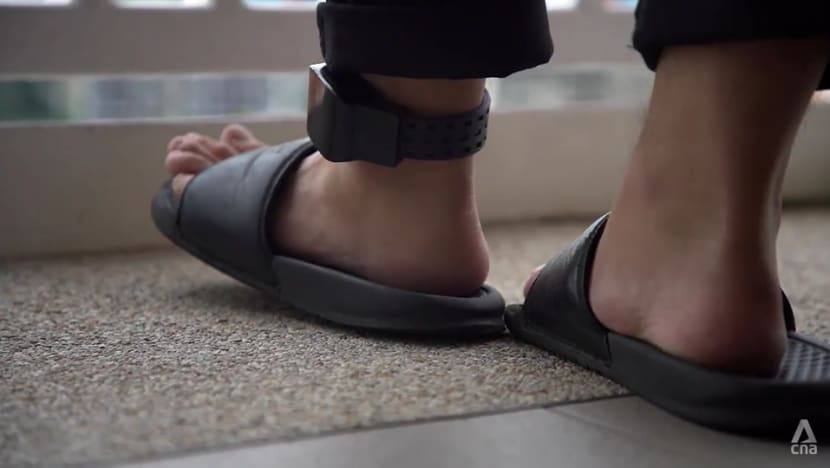Fewer probation orders issued in 2020 partly due to adjournment of less urgent cases during COVID-19

At least eight in 10 probationers are under the age of 21. Some of them are electronically tagged.
SINGAPORE: Fewer probation orders were issued last year compared to 2019, possibly due to the adjournment of less urgent cases during Singapore’s COVID-19 “circuit breaker”, said the Ministry of Social and Family Development (MSF) on Friday (Jun 4).
The adjournments resulted in “only a small number” of referrals for pre-sentence reports in April and May last year. The reports are commissioned by the courts to determine whether an offender is suited to be placed on probation.
A total of 428 new probation orders were issued in 2020 compared to 538 the year before, according to MSF’s Probation and Community Rehabilitation Service annual report released on Friday.
About 83 per cent of the new probation orders issued last year were for people below the age of 21.
Probation is a community rehabilitation sentence that requires the offender to be under the supervision of a probation officer for a period of between six months and three years.
Common offences for which probation orders are issued include voluntarily causing hurt, theft, and fraud or forgery.
In a media release, MSF said the number of probation orders granted each year depends on several factors, including the risk profile of cases.
“The decrease in PSR (pre-sentence reports) referrals from the Youth Court and State Courts and impact of COVID-19 safety measures on the number of cases dealt with in 2020 were also contributing factors for the lower number of probation orders passed that year,” said MSF.
READ: ‘I regret committing crime’: Inside the Probation Service and lives of youth offenders
In 2020, there were 95 referrals for pre-sentence reports from the Youth Court, compared to 137 in 2019. Meanwhile, the number of referrals for pre-sentence reports from the State Courts in 2020 was 509, compared to 534 in 2019.
Overall, the number of referrals in 2020 was 10 per cent lower than in 2019, but still higher than in 2018, said MSF.
OVERALL COMPLETION OF PROBATION ORDERS
The overall completion of probation orders increased from 80 per cent in 2019 to 82 per cent in 2020, remaining “high” despite challenges brought about by COVID-19, said MSF.
The overall completion rate in 2018 was 84 per cent.
However, for probation orders issue by the Youth Court, the completion rate fell for the second year. It was 73 per cent in 2018, dropping to 66 per cent in 2019 and 64 per cent in 2020.
“The completion rates are influenced by the probationers’ profiles such as age, risk levels, responsiveness to interventions and the complexities of the cases,” said MSF.
“Year-on-year changes to the completion rates can also be expected due to fluctuations to cohort size.”
READ: Social workers say early, coordinated help for at-risk youths may be reaping rewards
Eighty probation orders were revoked in 2020, with 30 people reoffending while on probation. The remaining 50 persistently failed to comply with probation conditions, according to the annual report.
Probation conditions include abiding by time restrictions, performing community service, attending rehabilitation programmes, returning to hostels and having no serious infringements at school or work.
DISRUPTIONS CAUSED BY COVID-19
To protect the health of probationers and officers during the COVID-19 pandemic, most probation officers conducted individual and family sessions, rehabilitative programmes and case conferences virtually, said MSF.
Only probationers with more complex needs or those who showed poor progress on probation attended physical sessions with safe management measures.
“Recognising the stressors brought about by the pandemic, extra care was taken to check in regularly with probationers on areas such as family relationships, emotional well-being and financial circumstances,” said MSF, adding that probation officers would refer families to support services where needed.
MSF said it also used technology as a communication and rehabilitation tool.
For instance, the RehabProtect mobile application allows probationers to schedule reporting sessions, track their progress on rehabilitation programmes and community service, as well as access relevant resources. It also streamlines administrative tasks involved in case management.
“The application aims to instil greater ownership in probationers and their guardians over their probation journey,” said MSF.
In addition, the Probation and Community Rehabilitation Service is also exploring an online game format where probationers make decisions on real-life challenges and risky situations.
Probation officers and family members will be able to observe probationers’ actions in the game to gain insights into their thought processes to “reinforce learning and better support their progress while on probation”, said MSF.












